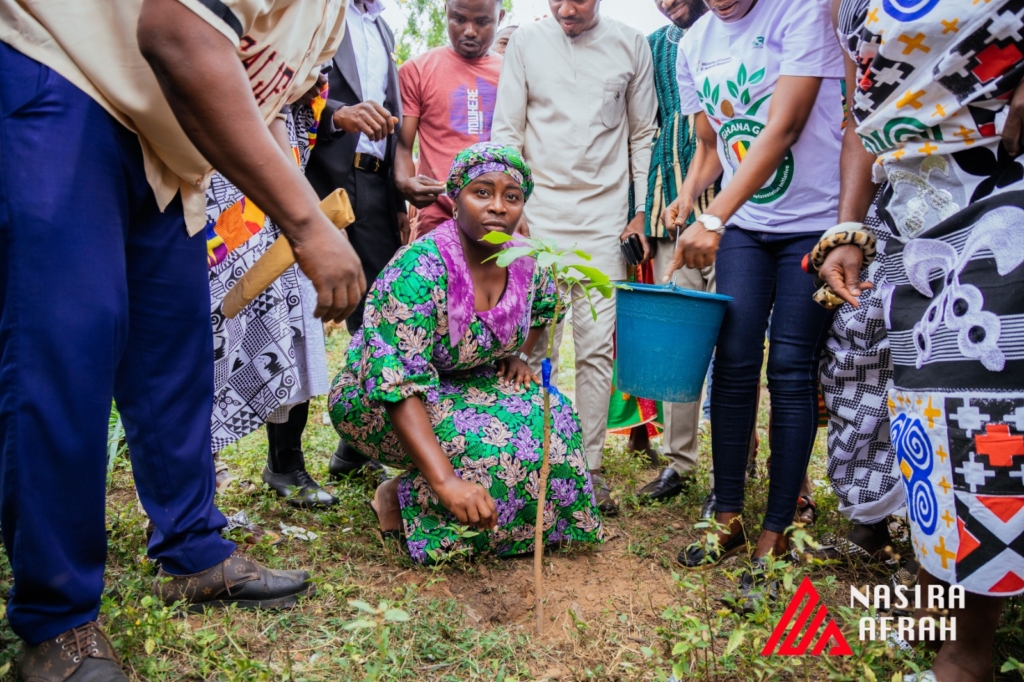
In a strategic move to build climate resilience and restore ecological balance in Ghana’s forest-depleted zones, Nasira Afrah, the Member of Parliament for Sekyere Afram Plains, has launched the Nasira Green Initiative a community-based tree-crop planting project aimed at regenerating degraded land and strengthening local livelihoods.
The initiative, launched in the farming town of Drobonso, is being recognised as a significant example of climate leadership at the constituency level, blending environmental advocacy with socio-economic empowerment. It mobilises local communities to take ownership of the land restoration process through education, reforestation, and agroforestry.
“This is more than an environmental project it’s a call for grassroots action,” she Afrah said. “We’re restoring not only our land but also our dignity, our economy, and our children’s future.”
A Constituency Model for Climate-Responsive Development
The project responds to urgent environmental threats in the area, including illegal logging, seasonal bushfires, and climate-driven shifts affecting agricultural productivity. With food security and water access increasingly at risk, the Nasira Green Initiative positions itself as a locally driven solution with scalable potential. At the center of the program is the “One Person, One Tree” campaign a participatory model that calls on every resident to plant and care for at least one tree.
The goal is to cultivate a culture of environmental stewardship and shared responsibility. “We cannot wait for national interventions alone. Communities must lead the way in protecting their environment,” Nasira Afrah told attendees.
Community Buy-In and Institutional Support
The launch drew wide participation from local and traditional authorities, including the Drobonsohene, Nana Dwamena Dankwa Dwibisaw, who lauded the initiative as a “transformative vision” for rural sustainability.
He called on community members to take personal ownership of tree planting efforts and proposed future incentive schemes for participants. Officials from the Forestry Commission and the Tree Crops Development Authority (TCDA) were present, offering technical and logistical support to ensure the long-term viability of the project. District Chief Executive Abubakar Issaka underscored the project’s alignment with national land restoration policies and Ghana’s broader climate adaptation goals.
“This initiative speaks directly to our development needs and our future. It is both timely and visionary,” he said.
Building Environmental Justice from the Ground Up
For Nasira Afrah, the project reflects a broader political commitment to environmental justice, rural empowerment, and long-term constituency development. “We are planting seeds not just of trees, but of justice, accountability, and sustainable growth,” she said.
The Nasira Green Initiative is expected to contribute to job creation, soil rehabilitation, and biodiversity preservation in Sekyere Afram Plains, creating a model that other rural constituencies could emulate.
As Ghana faces mounting climate challenges, the story unfolding in Sekyere Afram Plains serves as a reminder: the most powerful climate solutions often begin at the grassroots led by the very people whose lives are most affected.
DISCLAIMER: The Views, Comments, Opinions, Contributions and Statements made by Readers and Contributors on this platform do not necessarily represent the views or policy of Multimedia Group Limited.
DISCLAIMER: The Views, Comments, Opinions, Contributions and Statements made by Readers and Contributors on this platform do not necessarily represent the views or policy of Multimedia Group Limited.
Source: myjoyonline.com










